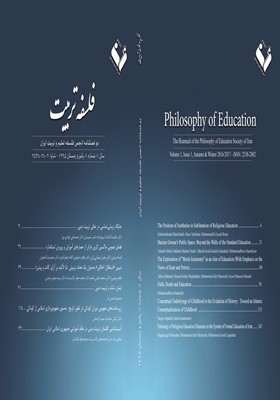Faith, Doubt and Education
Subject Areas :
1 -
Keywords: Islamic faith, Christian faith, doubt, constructivist realism,
Abstract :
The essence of faith is a controversial issue, especially among Muslim and, more prevalently, among Christian thinkers. In this connection, the relation between faith and doubt is one of the main cases of the diffrences of this controversy. In an attempt to pin down the sources of these differences, this paper trace their roots to matters such as differences in the contents of religious beliefs, the theoretical presuppositions of the religious thinkers, the different socio-political experiences of the religious societies and, finally, the differences in the intellectual-philosophical currents affecting these two religious fields. Admitting the important role of the last component, one can expect that the rapid growth of communications as the main channel of exchange of ideas may create opportunities for the Islamic thought to come into contact with rival and opposing views on account of which the Islamic Faith may face the same challenges that Christianity had to confront in recent centuries. This article, by using a concept analytical method toward explaining the relationship between faith and doubt, adopts an epistemological approach called constructivist realism as a basis for Islamic Faith and maintains that contrary to the belief by certain circles of Christianity, doubt cannot be regarded as an integral element of faith. Although the existence of doubt is undeniable, it is not a challenger vis-a-vis faith. This premise seems to predispose Islamic education to, on the one hand, promote tolerance regarding doubt and to emphasize effort and motivation for attaining certainty on the other.
آزادیان، م (1384). ایمان؛ مقایسه تطبیقی بین اسلام و مسیحیت. ماهنامه معرفت، 88، 17-29.
اعوانی، غ (1375). وضعیت دین و فلسفه در قرونوسطی و رنسانس، حکمت و هنر معنوی. تهران: نشر گروسی.
الیاده، م (1374). فرهنگ و دین. (بهاءالدین خرمشاهی، مترجم). تهران: طرح نو.
باقری، خ (1389). درآمدی بر فلسفه تعلیم و تربیت جمهوری اسلامی ایران: فلسفه برنامه درسی، جلد دوم. تهران: انتشارات علمی فرهنگی.
بشیریه، ح. (1370). پیش درآمدی بر تاریخ اندیشه تساهل سیاسی، نشریه دانشکده حقوق و علوم سیاسی 26، 119 - 152.
پاپکین، ر (1375). متافیزیک و فلسفه معاصر. (سید جلالالدین مجتبوی، مترجم). تهران: پژوهشگاه علوم انسانی و مطالعات فرهنگی.
پویا زاده، ا (1378). تئوری¬های ایمان و نقد جی ال مکی بر آنها (بر اساس مباني آیتالله جوادي آملي). مقالات و بررسی¬ها، 65، 117-132.
جوادی، م (1376). ایمان در عرصه کلام و قرآن. قم: معاونت امور اساتید و معارف اسلامی.
سروش محلاتی، م (1381). آزادی، عقل و ایمان. قم: دبیرخانه مجلس خبرگان رهبری.
سروش، ع (1385). بسط تجربه نبوی. تهران: نشر صراط.
سروش، ع (1388). فربهتر از ایدئولوژی. تهران: نشر صراط.
سروش، ع (بی¬تا). آزادی و عقل آزاد. مجله فرهنگ توسعه، 26.
صادق زاده قمصری، ف (1383). بررسی دیدگاه¬های اندیشمندان مسلمان درباره حقیقت ایمان. فصلنامه فلسفه و کلام اسلامی، 8 (26 و 27)،112-137.
غزالی، م (1360). شک و شناخت. (صادق آئینه¬وند مترجم). تهران: انتشارات امیرکبیر.
طباطبائی، م (1360). تفسیر المیزان، ج 18، ص 259.
کاکایی، ق (1383). ایمان از دیدگاه آکویناس. مقالات بررسی¬هادانشگاه تهران،76.
مجتهد شبستری، م (بی¬تا). مقاله آزادی و ایمان. مجله ایران فردا،27.
مجتهد شبستری. م (1371). حقیقت ایمان در نظر متکلمان. مقالات و بررسی¬ها،51 - 52.
مطهری، م (1372). عدل الهی. مقدمه هفت و هشت. تهران: صدرا.
یثربی، ی (1380). شک و ایمان. رواق اندیشه، 5، 25-40
Barbour, I (1997). Religion and science: Historical and contemporary issues. San Francisco: HarperCollins.
Frankena, W (1969). Toward a philosophy of education. In Christopher J. Lucas (Ed.), What is philosophy of education? 268-291. Toronto: The Macmillan Company.
Given, L. M (2008). Encyclopaedia of qualitative research methods. California & London: SAGE Publications.
Gilson, E (1939). Reason and revelation in the middle ages. New York: Charles Scribner's Sons.
William, J (1985). An Introduction to the philosophy of religion. Englewood Cliffs, N.J.: Prentice-Hall


